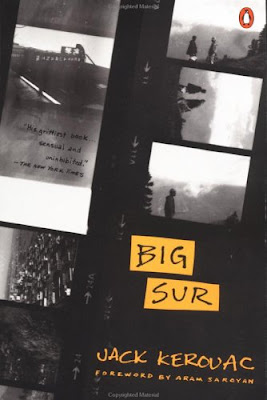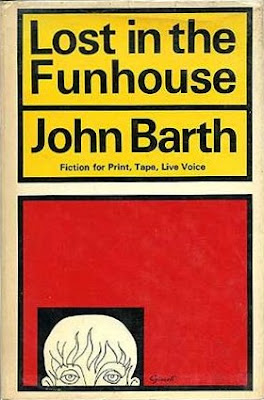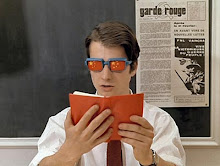1- William Gaddis THE RECOGNITIONS- a novel that examines human kind's propensity/need for fakery. It's sprawling, dense, frustrating, exhilarating and painfully, wonderfully human. And also very funny.
2- Thomas Pynchon GRAVITY'S RAINBOW- epic and surreal, with uncompromising flowing language, outlandish characters, and talking dogs. Labyrinthine and acidic, weird and dark. What might seem like an elephantine mix of indulgence and lack of discipline is really just the blunt reality that the author’s smarter than you. Smarter than me, too. My advice? Just lay back and soak it all up. I’m trying to decide what sounds better: comically bleak or bleakly comic
3- James Joyce ULYSSES- the heavyweight champion of modernism; once the code is broken, his characters and situations are drenched in truth and beauty. As rewarding as it is complex.
4- William Faulkner AS I LAY DYING- much like Joyce,
he's unconcerned with making it easy (though this one is easier to swallow than THE SOUND AND THE FURY, which I also adore), and his situations can build to gut-wrenching levels, but that's part of what makes it so powerful and lasting, along with his lack of sentimentality and the prickly dimension that he brings to his characters and subjects.
he's unconcerned with making it easy (though this one is easier to swallow than THE SOUND AND THE FURY, which I also adore), and his situations can build to gut-wrenching levels, but that's part of what makes it so powerful and lasting, along with his lack of sentimentality and the prickly dimension that he brings to his characters and subjects.
5- Herman Melville MOBY DICK- really the beginning of modernism in America. It has a very agreeable poetic sensibility that is actually far more at home in the middle of the 20th century than at the time of its writing, and Herm is as relevant now (as is Nat Hawthorne, for that matter) as he’s ever been. To love Melville is to love language.
6- Flannery O'Conner WISE BLOOD- what a freak-show. Southern Gothic on bad acid. Oh, the strychnine. Some of the most compelling bleakness I've read. There exists a very credible film version of this work, but if you haven’t seen it, please do yrself a favor and read the book first. The difference in quality is palpable.
7- William H. Gass THE TUNNEL- sometimes I'm a bit hesitant to tell people that I'm drawn to novels where the characters are so bitter, dysfunctional and steeped in failure, not so much out of any concern for what folks will think of me personally, but simply because it potentially amplifies the inadequacy of the phrase “reading for enjoyment”. You mean you actually like reading a 600+ page doorstop with a main character that’s a gargantuan asshole? Yep, you betcha! This has one of the most unlikable protagonists of any book I've read, but it also presents this character trying to write his way to terms with all his pain (and the pain he's caused others) in a manner that's quite riveting. Oh, that manner: the language!!!
8- William Gaddis JR- a lengthy expertly rendered critique of capitalism that is maddening, a little bit frightening, and often very humorous. That humor is really the key to Gaddis’ authorial presence, I think, since this book, his second, is markedly different from THE RECOGNITIONS. His first is a huge mixture of classic and modernist influence stuffed to the gills and ready to explode all over yr desk and reading room and consciousness. JR is far more obsessed with an intertwining sprawl of narrative and dialogue. An acquaintance once complained to me that Gaddis’ characters had diarrhea of the mouth, that they rarely listened to each other and that their words didn’t feel “real”. My compound retort was a) I don’t read for “real” and b) regarding the ratio of talking to listening, have you been to a bar lately? When Gaddis’ characters get a few drinks in them they often start spilling out gorgeous verbiage in a way that’s all too familiar to yrs truly. I first read this roughly six years ago and I couldn't believe how contemporary it felt.
9- James Joyce PORTRAIT OF THE ARTIST AS A YOUNG MAN- Everything I've read by Joyce has left a big impression. Stephen Dedalus is one of the earliest and greatest examples of the downtrodden hero, a phenomenon that became quite common in fiction, some would say too much so, later in the century. Lots of folks dig Holden Caulfield, and yeah I dig him too, but ol’ Stephen Hero appealed to me more as a young man (ahem) due to his old nature, shouldering the weight of history and art with solemnity, profundity and a lack of pretense. Caulfield is surely cool, but Dedalus is complicated and fascinating.
10- Jack Kerouac BIG SUR- can be a big drag for those who are deeply attached to the transcendental gusto of the early novels. This is a book for more mature sensibilities, for people who are familiar with disappointment and disillusionment. He was drinking himself to death while writing this one. I’m tempted to sandwich this baby into a massive re-read with Malcolm Lowry’s UNDER THE VOLCANO and the works of Fred Exley, but Christmas is coming and I’m worried I might succumb to the titanic despondency and suffer a self-inflicted wound to the brainpan. Oh, I jest. Maybe. The power of literature is strong. Whoever finds my decomposing carcass has to take care of my cat, okay?
11- Herman Melville PIERRE, OR THE AMBIGUITIES- a dismal commercial failure while being an estimable and complex artistic endeavor, it's a sustained rumination on folly (both social and artistic) and the problems that arise from human interaction and desire. Ambiguity is constant in Melville's mature work, and this thorny masterpiece is the best example of the author’s need for unresolved situations and unanswered questions.
12- Mark Twain THE ADVENTURES OF HUCKLEBERRY FINN- maybe the best story (if not the best writing, though it should go without saying that his words are also great) in all American fiction.
13- John Barth LOST IN THE FUNHOUSE- short works by one the great postmodernists. The title story is an exquisite commentary on self-doubt and the strain of artistic aspiration (and the dread of failure that often accompanies it). Everything here possesses an estimable knowledge of literature and how to carry its themes into a contemporary framework. Old and new at the same time.
14- William H. Gass OMENSETTER'S LUCK- his first novel. Comes off a bit like Faulkner if he were a part of the post-WWII post-grad scene. When taken in unison with the short story collection IN THE HEART OF THE HEART OF THE COUNTRY and the slim and still brilliant mash-up of structure and visuals and of course (always) language that is WILLIE MASTERS' LONESOME WIFE, it’s damned startling just how explosive this now esteemed man of letters was out of the starting gate. Maybe the most neglected American fictioneer of the second half of the last century. And he’s still going strong.
15- James Joyce DUBLINERS- there have been thousands of short story collections since this pup was published and very few before. But the worth of these stories is far greater than just that of originality and influence; it's also the depth of feeling and the scope of human emotion that's contained within.
16- Stanley Elkin THE MAGIC KINGDOM- about a busload of terminally ill kids who are taken on a trip to Disneyworld. And it's hilarious. Elkin is the combination of two wonderful things: a Jewish wise-ass and comma addiction.
17- William S. Burroughs THE NAKED LUNCH- it's been over ten years since I've read this, so it makes the list due to the sheer impact that it had on my developing mind. A book that encompasses sci-fi, experimental lit, beat sensibilities, weird smut, and a thick dose of 20th century pessimism. It only takes a hard cold look at the present tense to understand that Burroughs was far less paranoid than his detractors often claimed and far more prescient than even his biggest boosters thought.
18- Henry James RODERICK HUDSON- I have some major gaps in my knowledge of James, but this is my favorite out of what I've read. The short novel's title character is a sculptor who becomes consumed by an unhealthy attraction to a young princess. But what it's really about, for me, is James' beautiful sentences. He comes up with page after page of words that positively beg to be read aloud. I've discussed James with people who totally dismiss him because he writes slow novels about rich people, but I can't get with that dismissal at all. In my estimation, it's not about what it's about (though this can surely add to the experience). It's about how it's written, how it sounds coming of the (mind’s) tongue.
19- David Foster Wallace THE BROOM OF THE SYSTEM- out of everything listed here, this book has the most to say to me from a purely generational standpoint. It's a bit like early Pynchon, steeped in post-modern influence and absurd situations that place it in direct opposition to the brigade of realist fiction. Wallace's stuff has a looseness (a punk sensibility, perhaps) that differentiates it from his pomo antecedents: where those books positively, proudly drip with higher-learning, Wallace comes off like a disheveled spiky-haired smart-ass who can (and will) ace the test without even trying, so he just shrugs it off as no big deal. All the while, he's laying dangerous land-mines in his pages that seem to spell certain disaster, only to ultimately prove an essential ingredient in the fabric of the (master)work.
20- William Gaddis A FROLIC OF HIS OWN- Kerouac compared Burroughs to Swift, and yeah, I can see it, DO see it in fact, but the most Swiftian writer (besides Swift) that I (and maybe Sven Birkerts) can think of is Mr. Gaddis. As formidable as his prose can be purely from a standpoint of language construction (and this uncompromising style is what gets him described as simply a difficult writer by hit-and-run magazine blurbists), the emotional heft of his work is caustic satire, and the guy is absolute bulls-eye.





















5 comments:
Mr. Neff,
Quite a list! I agree with the bulk of your choices as important works, and the rest I have yet to enjoy. It is easy, once you head down that road, to succumb to the immersive experience that is to read a complex and language driven tour of greatly flawed and even sickly twisted characters and happenings. I myself also prefer a well written, stark and even depressing read. I find that in the end they are actually much more uplifting in their discovered truths and in their relatability due to lack of saccharine. One grows much greater out of suffering than contentment. Joyce, Melville, O'Conner & Faulkner are also favorites of mine. I have never read Gaddis and should probably re-read some Twain. But I digress, and rest assured Wendell will be cared for. Though I would be thoroughly pissed.
Christy,
You raise some very good points, and it's cool that we share some key faves. It's interesting how much diversity there is in the four names you mention. Melville often seemed entralled with humanity, particularly physical excellence (he loved him some sailors), which is something that he shared with Whitman. On the other hand, O'Conner's gothic voice is drenched in alienation, solitude and ever encroaching death. It's not hard to conclude that she wasn't a people person. And I often think that Joyce and Faulkner are Modernist brothers across the water, but it's still quite fascinating how distinct they both were. Joyce is right behind Gaddis as my favorite prose writer. Unlike most, he began in an essentially accessible mode and incrementally became more and more complex, culminating with the wild wooly and weird beauty of FINNEGANS WAKE, where language is just spilling out all over the place. As he grew older, Joyce's work really took on a non-transcendental wonderment with the wide range of existence. Faulkner, in contrast, is gloomier. He's gothic as well, but I generally feel he cares for his characters (even the shitheels) and seems more plagued by the futility of life. Re-reading Twain is always a joy. Along with Crane, he was the yin to the Transcendentalists' yang, with Melville and Hawthorne hanging somewhere in the middle (I'm thinking of THE CONFIDENCE MAN, which I need to read again). I have all of Gaddis' stuff, so if you would like, I can lend them to you one at a time. I recommend starting with JR. Thanks for letting me know that Wendell will be in good hands, and you really needn't worry about my bit of dark humor. I've quite a few more things to accomplish before I check out of here. And hey, thanks for posting!!!! It really adds to the endeavor, and yr opinions are of great value.
To Joseph
Nice blog. Lots of interesting subjects- Mingus, Hendrix, Fincher, Ozu. I share many of your tastes.
One of the guys here- Stanley Elkin- and quite a few of the books (Roderick Hudson etc) I haven’t read. Some I’ve been meaning to read for a along time, like William Gass.
I also love these incredible big books you mention- Moby Dick, The Recognitions and especially Gravity’s Rainbow, one of my all time faves. In this respect, though I’m a half-Irish Brit, I prefer the Americans. Ulysses I struggled through but apart from the occasional brilliant passage I didn’t get it. I much prefer ‘Portrait of the Artist’.
Having said that, David Foster Wallace was one writer I really wanted to like- liked him as a personality in clips I saw on Youtube- but apart from some of the essays in ‘A Supposedly Fun Thing’ I didn’t respond to him either. Tried reading both ‘Broom’ and ‘Infinite Jest’ and gave up.
Ps Are you sure there was a talking dog in Gravity’s Rainbow? I thought that was in Mason & Dixon? Maybe there’s one as well in ‘Gravity’ but I can’t recall.
Kevin,
Thank you for the comments.
I've wondered on occasion if ULYSSES would've had a lesser impact on me if I'd read it after THE RECOGNITIONS and GRAVITY'S RAINBOW.
Wallace's work really engenders a diversity of opinion. The essays are to some extent the common ground for those who love his work and those who don't.
I'd like to hear your thoughts on Elkin and Gass after you read them, so please drop in an leave a few lines.
There is a talking dog in RAINBOW, but it's very brief.
Joseph
Post a Comment